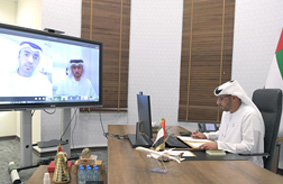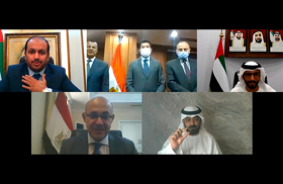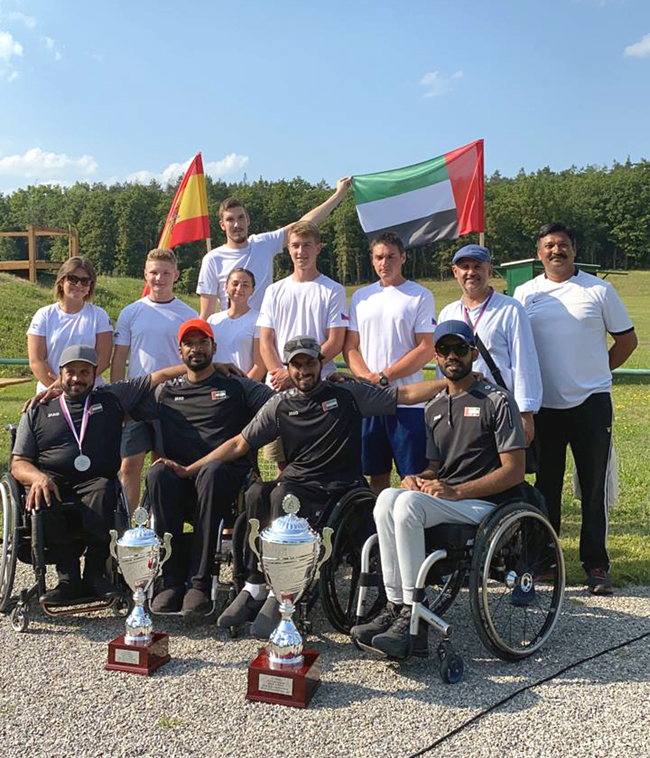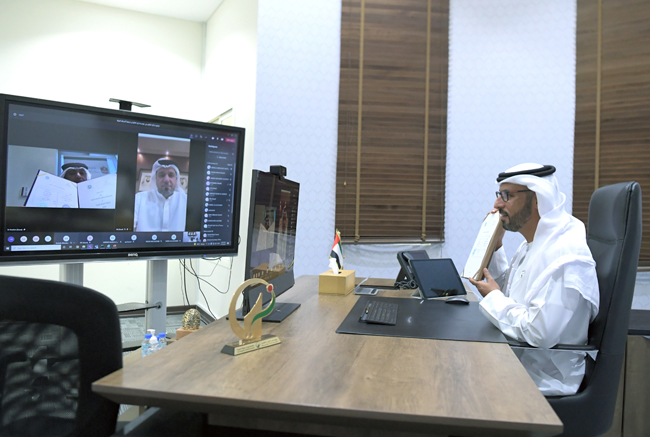Zayed Higher Organization for People of Determination (ZHO) has affirmed its concern to follow the best international standards, apply the most effective practices, and work towards finding a host of innovative ideas to develop its services in consistence with technological development worldwide in care and rehabilitation areas. It also asserted that it has given heed to the use of high technology in rehabilitating people of determination, and has been keen to provide different types of it, to suit the those groups, realizing the effective and core role of treatment.
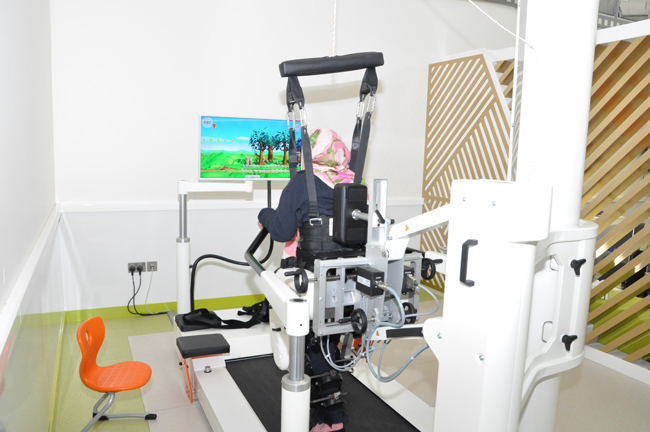
High-tech Applications in the Field of Healthcare and Services for People of Determination
Application of technology in “rehabilitation" increases the ability of therapists to deliver treatment service with greater intensity and less effort
Demanding intensified efforts to conduct research to confirm the effectiveness of robotics and high technology in rehabilitating people of determination
Zayed Higher Organization for People of Determination (ZHO) has affirmed its concern to follow the best international standards, apply the most effective practices, and work towards finding a host of innovative ideas to develop its services in consistence with technological development worldwide in care and rehabilitation areas. It also asserted that it has given heed to the use of high technology in rehabilitating people of determination, and has been keen to provide different types of it, to suit the those groups, realizing the effective and core role of treatment.
This came during High-tech Applications in the Field of Healthcare and Services for People of Determination, virtually organized by ZHO in cooperation with the Swiss company Hocoma, a world leader in the development, manufacture and marketing of robotic devices, along with its strategic partners from within the United Arab Emirates, the Kingdom of Saudi Arabia and Switzerland, in order to invest in the vast experience of the partners in the area of rehabilitating people of determination, particularly after adopting modern technologies and rehabilitation robots that are used to rehabilitate people with neurological and musculoskeletal disorders.
The forum emphasized the need to intensify efforts to conduct research to confirm the effectiveness of robotics and high technology in rehabilitating people of determination, and the importance of training medical cadres to use smart devices in rehabilitating people of determination, as well as the need to adopt a training program for physiotherapy graduates on smart robotic devices for treating and rehabilitating people of determination. The forum underscored that robotic therapy does not replace traditional physiotherapy and it is part and parcel of it. It added that it is necessary to continue to use internationally approved tools to assess the development of the case and take the appropriate decision for the sake of the patient.
The forum recommended that the use of rehabilitation therapy technology has a positive effect on the cardio-pulmonary system, the nervous system and the musculoskeletal system, noting that the rehabilitation technology contributed to helping improve daily life skills, but it should be stopped after achieving the targeted skill.
ZHO revealed the completion of 2,690 rehabilitation sessions implemented on the Lokomat device in the Smart Rehabilitation Laboratory, which is one of 11 devices for various uses in ZHO for 115 people of determination since the Laboratory was launched early 2018. The highest percentage of beneficiaries was recorded in healthcare management services during the second quarter of 2019, amounting to 420 beneficiaries of people of determination, accounting for 36% of the usual number annually, compared to 308-320 beneficiaries before the launch of the Laboratory. The laboratory also contributed to the high coverage of treatment sessions for occupational therapy and physiotherapy by 45%.
His Excellency Abdulla Abdulalee Alhumaidan, ZHO's Secretary-General, stressed that the topic of high technology applications in the field of healthcare and the service of people of determination has been given special care by ZHO, as applying this technology in rehabilitation increases the ability of therapists to deliver treatment service with greater intensity and less effort. Further, it provides intensive treatment in a form that stimulates the patient and encourages movement and performance through interactive games and virtual reality gaming that attract patients, particularly children, a matter which enhances their response to treatment, thus ensuring a more effective and participatory life for them.
ZHO's SG added: "ZHO has took the lead in launching the first integrated Middle East Smart Rehabilitation Laboratory for therapeutic services, becoming among the first who succeeded in leveraging this modern technology and robots to facilitate the integration of people of determination into their society, as part of its efforts to introduce high technologies in this area. The Laboratory was equipped with eleven pioneering world-class cutting-edge therapeutic devices, that can be controlled by computer and robotic assistive devices. It also signed a memo of understanding with the Swiss company Hocoma to adopt the Laboratory as its sole reference center in the Middle East in the field of therapeutic rehabilitation services using modern devices in rehabilitation programs."
His Excellency noted that the forum served as a platform for sharing ideas and presenting accomplishments, technologies and advanced devices that contribute to empowering people of determination and making their lives easier. It was also an opportunity to share experiences by health sector workers in the UAE, Saudi Arabia, and Switzerland, especially after adopting modern technologies and rehabilitation robots used to rehabilitate people with neurological and musculoskeletal disorders.
For her part, Amina Alyafei, Head of the Healthcare Department, confirmed that the ZHO's Smart Rehabilitation Laboratory contributed to raising the index of recipients of treatment services and the treatment sessions coverage index, as the total targeted 6-therapist-managed sessions used to be 42 per day, while the mechanism of operating the Laboratory, which contains 11 devices supported by virtual reality gaming and managed by 6 trained therapists certified by the competent authorities, raised the targeted sessions to 77 sessions only per day, in addition to individual sessions for various treatment services.
In the paperwork presented, Alyafei said that the Smart Rehabilitation Laboratory contributed to providing additional spaces and facilities for other uses by accommodating eight more cases than before. The certified therapists in the Laboratory were supported to be certified trainers in the Middle East and to maintain their professional skills by maintaining the balance of presenting the sessions in the Laboratory and the individual sessions. In this vein, she noted that the Healthcare Department is eager to increase the number of therapists from the national cadres and qualify them for training and certification by the competent authorities to raise the national experiences and the sustainability of Laboratory's in ZHO.
She reviewed ZHO's experience in managing the Laboratory and the strategies and plans for operating therapeutic sessions, which had an impact in monitoring the development of cases receiving treatment by using smart devices and providing additional vacancies for beneficiaries at the Abu Dhabi Care and Rehabilitation Center.
Organizing the forum, attended by healthcare providers working in rehabilitation and physiotherapy college students, aimed to sharing experiences in the field of using robots to rehabilitate people of determination, and presenting the outcomes of the research study on the effect of using the Lokomat device in the rehabilitation of people of determination, as well as supporting physiotherapists who use robotic devices in Abu Dhabi and the Gulf region.
The forum eyed two working sessions with presenting a host of paperwork and experiments. In the first session, paperwork was presented by Marco Burnek at Hocoma, on the comprehensive solution, and another one on the high technology needs during the pandemic was presented by Dr. Sunitha B Mysore, Professor from Fathima College of Health Sciences. A lecture was given by Dr. Ahmed Zahran in Sultan Bin Abdulaziz Humanitarian City (SBAHC), Saudi Arabia, on the use of technology in rehabilitation, a user model in SBAHC, paperwork was provided by Al Reem Hospital.
In the second session, paperwork was presented by ZHO on the effectiveness of robot-assisted rehabilitation, another one on the use of robots in rehabilitation at Al Reem Hospital, and one on rehabilitation using robots from Amana Healthcare.
SOURCE


